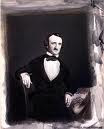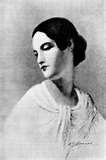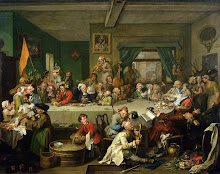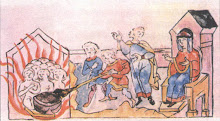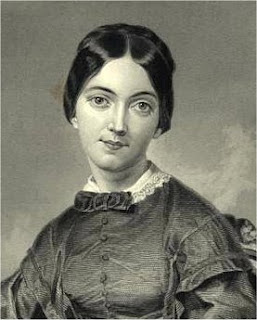
In 1898, Rufus Griswold's son William published what he claimed was the text of a letter Frances S. Osgood wrote to William's father in 1850. The letter reads:
For many years, this astonishing letter was accepted by Edgar Allan Poe's biographers--even the well-respected "The Poe Log" fell for it--despite the fact that there were, from the start, obvious reasons for doubting its authenticity. For one, there is the highly suspicious fact that we only have what William Griswold published. The actual manuscript of this letter--or even any sort of copy-text--has never surfaced. The text does not read as any sort of genuine letter--rather, it is all heavy-handed exposition, blatantly designed to put a particular story "on the record." And, of course, this letter of apology Virginia Poe supposedly wrote Osgood was never seen, or even mentioned anywhere else, by anyone--including Osgood and Rufus Griswold.
Despite all these indications that the letter was a clumsy hoax, its ridiculous assertions went unchallenged for nearly a century. Then, in 1990, Burton R. Pollin, in the December issue of the journal "Poe Studies" ("'Saroni's Musical Times': Documents Linking Poe, Osgood, and Griswold") revealed that Osgood's "Poe reminiscences," which Griswold incorporated in his "Life of Poe," were not written in 1850 for Griswold's use, as this letter (and Griswold's "Life of Poe") indicated. Rather, Osgood's "reminiscences" first appeared in an obscure periodical called "Saroni's Musical Times" in December 1849. Thus, this "Osgood to Griswold" letter was shown to be, as Pollin rather reluctantly had to concede, "a fabrication." (Considering that Pollin himself had previously used this same bogus letter as source material, one presumes he felt embarrassed for having been hoaxed.)
We do not know who truly wrote this letter--this cheap scam that has caused such damage not only to Poe's reputation, but Virginia's as well. (The image it paints of Poe's cringing ninny of a wife writing Osgood letters seeking forgiveness for having begged her "to be kind to Edgar," has a peculiarly nauseating air.) The most likely culprit, however, is the person who revealed this letter to the world, William Griswold himself. Griswold the Younger was obsessed--I do not think this is too strong a word--with trying to rehabilitate his father's seedy reputation, which he appears to have seen as a black mark against himself. His way of doing this was to promote not only the myth that Griswold the Elder had been entirely truthful about Poe, but that the late poet had been even worse than his literary executor had let on. What better way of doing this than by having Frances Osgood--whom everyone considered Poe's admirer--reveal her true disdain for him? Also, I don't believe Rufus Griswold could have written this letter, because it had always been part of his agenda to depict Osgood as Poe's close friend and defender, not his defamer. All in all, I think it probable that William inherited his dad's predilection for forgery.
Blatant lie though it is, this letter still has its interesting aspects. The document depicts Osgood as anxious to counter a widespread belief that she conducted a disgraceful pursuit of Poe--a claim that, according to the letter, was propagated by Elizabeth Ellet and Maria Clemm.
It would be good to know for certain if Mrs. Clemm had joined Ellet in making this accusation against Osgood. If Osgood had truly been Poe's friend, Mrs. Clemm would hardly have "slandered" her, and if there had been anything improper between Frances and Poe, his mother-in-law would hardly want to spread stories about their relationship that would denigrate his marriage to her daughter. According to Sarah Helen Whitman, Clemm and Osgood disliked each other, although she unfortunately failed to say why. If Mrs. Clemm had accused Osgood of causing trouble for Poe by making a shameless pest of herself over him, that would certainly explain the otherwise inexplicable enmity Osgood and Griswold had towards her.
The animosity shown towards Virginia Poe in this letter--strangely reminiscent of the attitude regarding her found in Elizabeth Ellet's 1846 letter to Osgood--is also significant. Surely, William Griswold--or whoever forged this letter--would not have expressed such a negative attitude towards Poe's wife unless they knew Osgood and/or Rufus Griswold had had some reason to resent her.
The question of who forged this letter is not as important as the question of why it was done. Certainly, the writer of this letter did so in order to counter something they knew had been widely known. One would particularly like to know why Osgood is made to say that this mythical letter from Virginia would "fully establish my innocence in a court of justice." It brings to mind Hiram Fuller's 1847 claim that Poe was contemplating legal action against certain "literary ladies." I am also reminded of an odd statement made by Rufus Griswold's friend Charles Briggs in 1877. Briggs claimed that Griswold suppressed certain "startling" evidence he possessed proving the "utter contempt" Poe really felt towards certain ladies who had been under the delusion that he had admired them. Was Mrs. Osgood among these ladies? Certainly, she was the only woman acquainted with Poe whom Griswold would have motive to protect.
From the tone of this spurious "Osgood to Griswold" letter, it seems logical that the "something" it was intended to refute was the fact that Maria Clemm and other "envious calumniators" had "singled out" Osgood for her intrusive and offensive behavior regarding Poe. If this was the case, it would completely demolish the conventional wisdom regarding the Osgood/Poe relationship.
"I trust you will write that life of Poe. I will do as you wished:- I will write, as far as is proper, in a letter to you, my reminiscences of that year, and try to make it interesting and dignified, and you in introducing it by one single sentence can put down at once my envious calumniators. You have the proof in Mrs. Poe's letter to me, and in his to Mrs. Ellet, either of which would fully establish my innocence in a court of justice-certainly hers would. Neither of them, as you know, were persons likely to take much trouble to prove a woman's innocence, and it was only because she felt that I had been cruelly and shamefully wronged by her mother and Mrs. E[llet] that she impulsively rendered me that justice. She, Mrs. Poe, felt grieved that she herself had drawn me into the snare by imploring me to be kind to Edgar-to grant him my society and to write to him, because, she said, I was the only woman he knew who influenced him for his good, or, indeed, who had any lasting influence over him. I wish the simple truth to be known,-that he sought me, not I him. It is too cruel that I, the only one of those literary women who did not seek his acquaintance-for Mrs. Ellet asked an introduction to him and followed him everywhere, Miss Lynch begged me to bring him there and called upon him at his lodgings. Mrs. Whitman besieged him with valentines and letters long before he wrote or took any notice of her, and all the others wrote poetry and letters to him,- It is too cruel that I should be singled out after his death as the only victim to suffer from the slanders of his mother. I never thought of him till he sent me his Raven and asked Willis to introduce him to me, and immediately after I went to Albany, and afterwards to Boston and Providence to avoid him, and he followed me to each of those places and wrote to me, imploring me to love him, many a letter which I did not reply to until bis wife added her entreaties to his and said that I might save him from infamy, and her from death, by showing an affectionate interest in him."
For many years, this astonishing letter was accepted by Edgar Allan Poe's biographers--even the well-respected "The Poe Log" fell for it--despite the fact that there were, from the start, obvious reasons for doubting its authenticity. For one, there is the highly suspicious fact that we only have what William Griswold published. The actual manuscript of this letter--or even any sort of copy-text--has never surfaced. The text does not read as any sort of genuine letter--rather, it is all heavy-handed exposition, blatantly designed to put a particular story "on the record." And, of course, this letter of apology Virginia Poe supposedly wrote Osgood was never seen, or even mentioned anywhere else, by anyone--including Osgood and Rufus Griswold.
Despite all these indications that the letter was a clumsy hoax, its ridiculous assertions went unchallenged for nearly a century. Then, in 1990, Burton R. Pollin, in the December issue of the journal "Poe Studies" ("'Saroni's Musical Times': Documents Linking Poe, Osgood, and Griswold") revealed that Osgood's "Poe reminiscences," which Griswold incorporated in his "Life of Poe," were not written in 1850 for Griswold's use, as this letter (and Griswold's "Life of Poe") indicated. Rather, Osgood's "reminiscences" first appeared in an obscure periodical called "Saroni's Musical Times" in December 1849. Thus, this "Osgood to Griswold" letter was shown to be, as Pollin rather reluctantly had to concede, "a fabrication." (Considering that Pollin himself had previously used this same bogus letter as source material, one presumes he felt embarrassed for having been hoaxed.)
We do not know who truly wrote this letter--this cheap scam that has caused such damage not only to Poe's reputation, but Virginia's as well. (The image it paints of Poe's cringing ninny of a wife writing Osgood letters seeking forgiveness for having begged her "to be kind to Edgar," has a peculiarly nauseating air.) The most likely culprit, however, is the person who revealed this letter to the world, William Griswold himself. Griswold the Younger was obsessed--I do not think this is too strong a word--with trying to rehabilitate his father's seedy reputation, which he appears to have seen as a black mark against himself. His way of doing this was to promote not only the myth that Griswold the Elder had been entirely truthful about Poe, but that the late poet had been even worse than his literary executor had let on. What better way of doing this than by having Frances Osgood--whom everyone considered Poe's admirer--reveal her true disdain for him? Also, I don't believe Rufus Griswold could have written this letter, because it had always been part of his agenda to depict Osgood as Poe's close friend and defender, not his defamer. All in all, I think it probable that William inherited his dad's predilection for forgery.
Blatant lie though it is, this letter still has its interesting aspects. The document depicts Osgood as anxious to counter a widespread belief that she conducted a disgraceful pursuit of Poe--a claim that, according to the letter, was propagated by Elizabeth Ellet and Maria Clemm.
It would be good to know for certain if Mrs. Clemm had joined Ellet in making this accusation against Osgood. If Osgood had truly been Poe's friend, Mrs. Clemm would hardly have "slandered" her, and if there had been anything improper between Frances and Poe, his mother-in-law would hardly want to spread stories about their relationship that would denigrate his marriage to her daughter. According to Sarah Helen Whitman, Clemm and Osgood disliked each other, although she unfortunately failed to say why. If Mrs. Clemm had accused Osgood of causing trouble for Poe by making a shameless pest of herself over him, that would certainly explain the otherwise inexplicable enmity Osgood and Griswold had towards her.
The animosity shown towards Virginia Poe in this letter--strangely reminiscent of the attitude regarding her found in Elizabeth Ellet's 1846 letter to Osgood--is also significant. Surely, William Griswold--or whoever forged this letter--would not have expressed such a negative attitude towards Poe's wife unless they knew Osgood and/or Rufus Griswold had had some reason to resent her.
The question of who forged this letter is not as important as the question of why it was done. Certainly, the writer of this letter did so in order to counter something they knew had been widely known. One would particularly like to know why Osgood is made to say that this mythical letter from Virginia would "fully establish my innocence in a court of justice." It brings to mind Hiram Fuller's 1847 claim that Poe was contemplating legal action against certain "literary ladies." I am also reminded of an odd statement made by Rufus Griswold's friend Charles Briggs in 1877. Briggs claimed that Griswold suppressed certain "startling" evidence he possessed proving the "utter contempt" Poe really felt towards certain ladies who had been under the delusion that he had admired them. Was Mrs. Osgood among these ladies? Certainly, she was the only woman acquainted with Poe whom Griswold would have motive to protect.
From the tone of this spurious "Osgood to Griswold" letter, it seems logical that the "something" it was intended to refute was the fact that Maria Clemm and other "envious calumniators" had "singled out" Osgood for her intrusive and offensive behavior regarding Poe. If this was the case, it would completely demolish the conventional wisdom regarding the Osgood/Poe relationship.

